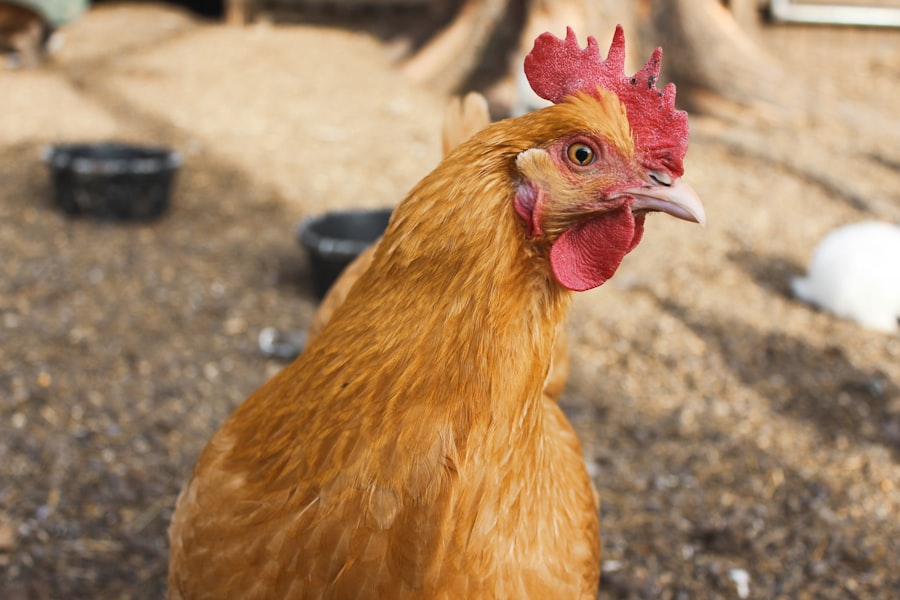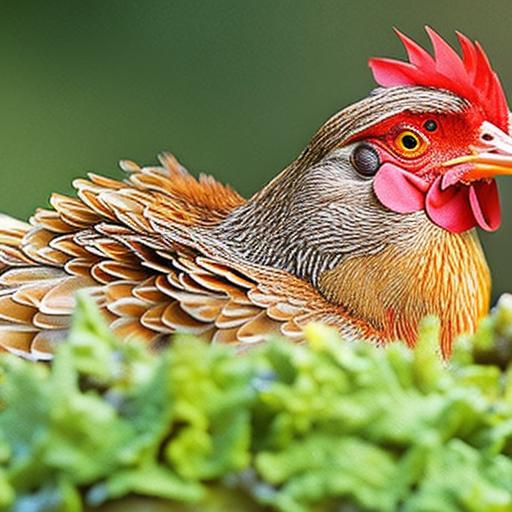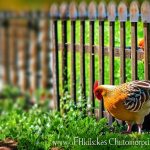Keeping chickens safe is crucial for their health and happiness. As a chicken owner, it is your responsibility to provide them with a secure and comfortable environment. There are several factors that can pose a threat to your flock, including predators, extreme weather conditions, and unsanitary living conditions. By taking the necessary precautions and implementing proper safety measures, you can ensure the safety and well-being of your chickens.
Key Takeaways
- Choosing the right location for your chicken coop is crucial for their safety and well-being.
- Building a secure chicken coop with strong materials and design is essential to protect against predators.
- Predator-proofing your chicken coop with tips and tricks such as burying wire mesh and using motion-activated lights can help keep your chickens safe.
- Maintaining a clean and healthy chicken coop environment is important for preventing diseases and keeping your chickens happy.
- Providing adequate space and comfort for your chickens, as well as preventing and treating common ailments, is key to ensuring the safety and happiness of your flock.
Choosing the Right Location for Your Chicken Coop
When it comes to choosing the right location for your chicken coop, there are a few important factors to consider. First, you need to determine the size of your flock and the space needed for their coop. Chickens require enough space to move around comfortably and engage in natural behaviors such as scratching and dust bathing.
In addition to size, you should also look for a location that is safe from predators. This means choosing an area that is not easily accessible to raccoons, foxes, or other animals that may harm your chickens. Good drainage is also important to prevent flooding and water accumulation in the coop.
Lastly, make sure the coop is easily accessible for cleaning and maintenance. You will need to clean the coop regularly to prevent the buildup of bacteria and parasites. Having easy access will make this task much easier and more efficient.
Building a Secure Chicken Coop: Materials and Design
Building a secure chicken coop is essential for protecting your flock from predators and providing them with a safe and comfortable living space. When it comes to materials, it is best to use sturdy materials like wood or metal. These materials are durable and can withstand the elements.
The design of the coop is also important. It should be well-ventilated to ensure proper airflow and prevent the buildup of ammonia from chicken droppings. Additionally, make sure there is enough space for your chickens to move around comfortably. Overcrowding can lead to stress and aggression among the flock.
To further enhance the security of your coop, install secure locks and latches on all doors and windows. This will prevent predators from gaining access to the coop and harming your chickens.
Predator-Proofing Your Chicken Coop: Tips and Tricks
Predators can pose a significant threat to your flock, so it is important to take steps to predator-proof your chicken coop. One effective method is to use wire mesh to cover windows and vents. This will prevent predators from entering the coop while still allowing for proper ventilation.
Another important step is to bury wire mesh around the perimeter of the coop. This will prevent predators from digging under and gaining access to your chickens. Make sure to bury the wire mesh at least a foot deep to ensure it is secure.
Installing motion-activated lights or alarms near the coop can also be an effective deterrent for predators. The sudden burst of light or sound can scare them away and protect your flock.
Maintaining a Clean and Healthy Chicken Coop Environment
Maintaining a clean and healthy environment is essential for the well-being of your chickens. Regular cleaning is necessary to prevent the buildup of bacteria and parasites that can cause illness. Remove any droppings, soiled bedding, and uneaten food on a daily basis.
When cleaning the coop, it is best to use natural cleaning products like vinegar and baking soda. These are safe for your chickens and will not leave behind any harmful residues. Avoid using harsh chemicals or bleach, as these can be toxic to your flock.
Provide fresh bedding and nesting material for your chickens regularly. This will keep them comfortable and help prevent the spread of bacteria and parasites.
Feeding and Watering Your Chickens: Best Practices

Feeding your chickens a balanced diet is crucial for their health and productivity. A good diet should include protein, grains, and vegetables. You can provide them with a commercial feed that is specifically formulated for chickens, or you can create your own feed mix.
In addition to a balanced diet, it is important to provide your chickens with clean water at all times. Make sure to check their water supply regularly and clean and refill it as needed. Chickens can become dehydrated quickly, especially during hot weather, so it is important to monitor their water intake.
Avoid feeding your chickens spoiled or moldy food, as this can make them sick. Only provide them with fresh and high-quality food to ensure their health and well-being.
Protecting Your Chickens from Extreme Weather Conditions
Extreme weather conditions can pose a threat to your flock, so it is important to take steps to protect them. During hot weather, provide shade and ventilation in the coop. This can be achieved by installing windows or vents that can be opened or closed as needed. You can also use shade cloth or tarps to create shaded areas within the coop.
During cold weather, it is important to insulate the coop to keep your chickens warm. This can be done by adding insulation to the walls and roof of the coop. You can also use straw or hay as bedding material to provide additional insulation.
Regardless of the weather conditions, make sure your chickens have access to clean water at all times. This may require using heated waterers during freezing temperatures to prevent the water from freezing.
Providing Adequate Space and Comfort for Your Chickens
Providing adequate space and comfort for your chickens is essential for their well-being. Chickens need enough space to move around and stretch their wings. Overcrowding can lead to stress, aggression, and health problems.
In addition to space, provide perches and nesting boxes for your chickens. Perches allow them to rest and sleep off the ground, which can help prevent leg problems. Nesting boxes provide a comfortable and secure place for them to lay their eggs.
Avoid overcrowding your coop. If you notice that your flock is becoming too large for the space, consider expanding the coop or reducing the number of chickens.
Health and Wellness: Preventing and Treating Common Chicken Ailments
Keeping your chickens healthy is crucial for their overall well-being. It is important to keep an eye out for signs of illness, such as lethargy, loss of appetite, and abnormal behavior. If you notice any of these signs, it is important to take action immediately.
One important step in preventing the spread of disease is to quarantine sick chickens. This will prevent the illness from spreading to the rest of the flock. Consult with a veterinarian if you suspect that your chickens are sick. They can provide guidance on treatment options and preventive measures.
Regularly check your chickens for external parasites such as mites and lice. These pests can cause discomfort and health problems for your flock. If you notice any signs of infestation, treat your chickens with appropriate medications or natural remedies.
Ensuring the Safety and Happiness of Your Flock
Ensuring the safety and happiness of your flock requires attention and care. By following these tips and tricks, you can create a secure and comfortable environment for your chickens. Remember to regularly assess the condition of your coop, monitor your chickens’ health, and provide them with a balanced diet and clean water. With proper care, you can enjoy the benefits of raising healthy and happy chickens.
If you’re a chicken owner, you know how important it is to keep your feathered friends safe and comfortable. One crucial aspect of ensuring their well-being is by insulating their coop properly. Insulation helps regulate the temperature inside the coop, keeping chickens warm in winter and cool in summer. If you’re unsure about how to insulate a chicken coop, check out this informative article on Poultry Wizard: How to Insulate a Chicken Coop. It provides step-by-step instructions and valuable tips to help you create a cozy and secure environment for your chickens.
FAQs
What are the common predators of chickens?
Common predators of chickens include foxes, raccoons, coyotes, snakes, hawks, and owls.
What are the best ways to secure a chicken coop?
The best ways to secure a chicken coop include using sturdy fencing, burying the fencing underground, using hardware cloth instead of chicken wire, securing all openings with locks, and installing motion-activated lights or alarms.
How can I protect my chickens from aerial predators?
To protect chickens from aerial predators such as hawks and owls, cover the chicken run with netting or wire mesh, and provide plenty of hiding places for the chickens to take cover.
What should I do if a predator attacks my chickens?
If a predator attacks your chickens, remove any injured or dead birds immediately, and secure the coop and run to prevent further attacks. You may also want to consider setting traps or hiring a professional to remove the predator.
What are some natural ways to deter predators from my chicken coop?
Some natural ways to deter predators from your chicken coop include planting thorny bushes around the perimeter, using predator urine or feces as a deterrent, and keeping a guard dog or other protective animal on the property.
Meet Walter, the feathered-friend fanatic of Florida! Nestled in the sunshine state, Walter struts through life with his feathered companions, clucking his way to happiness. With a coop that’s fancier than a five-star hotel, he’s the Don Juan of the chicken world. When he’s not teaching his hens to do the cha-cha, you’ll find him in a heated debate with his prized rooster, Sir Clucks-a-Lot. Walter’s poultry passion is no yolk; he’s the sunny-side-up guy you never knew you needed in your flock of friends!







